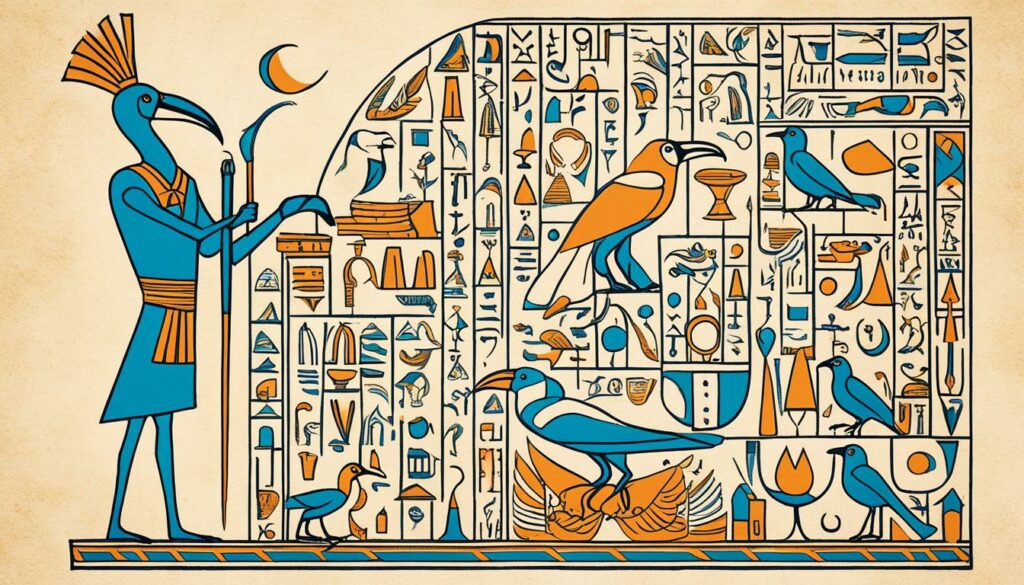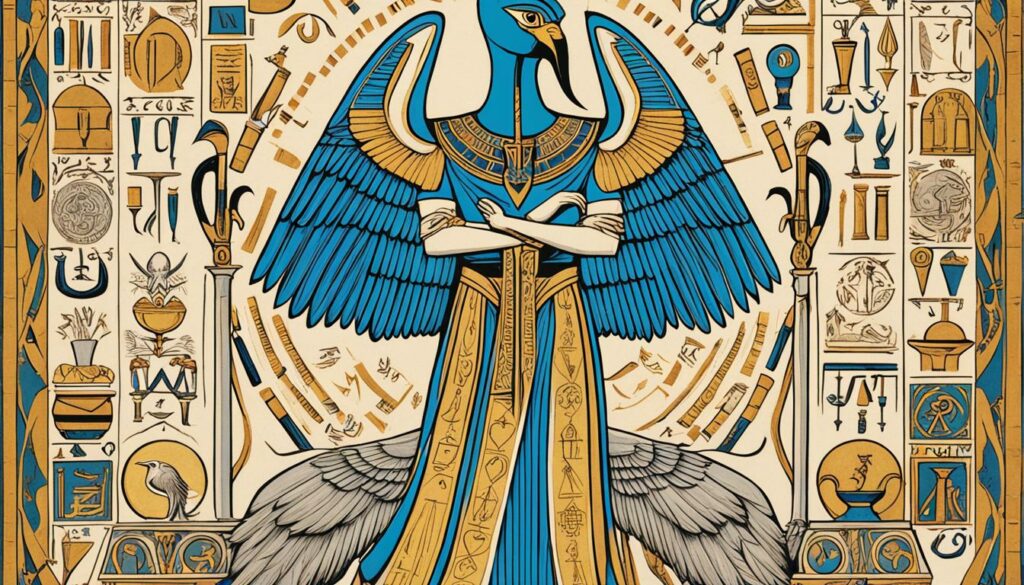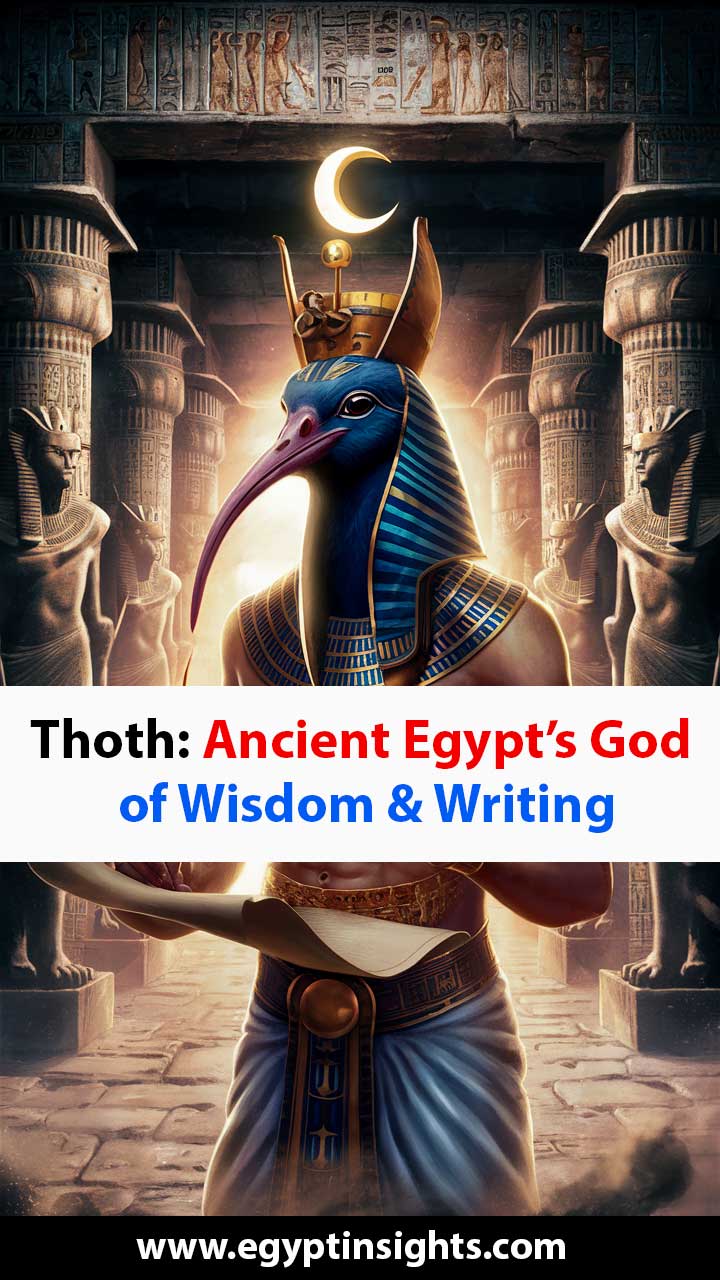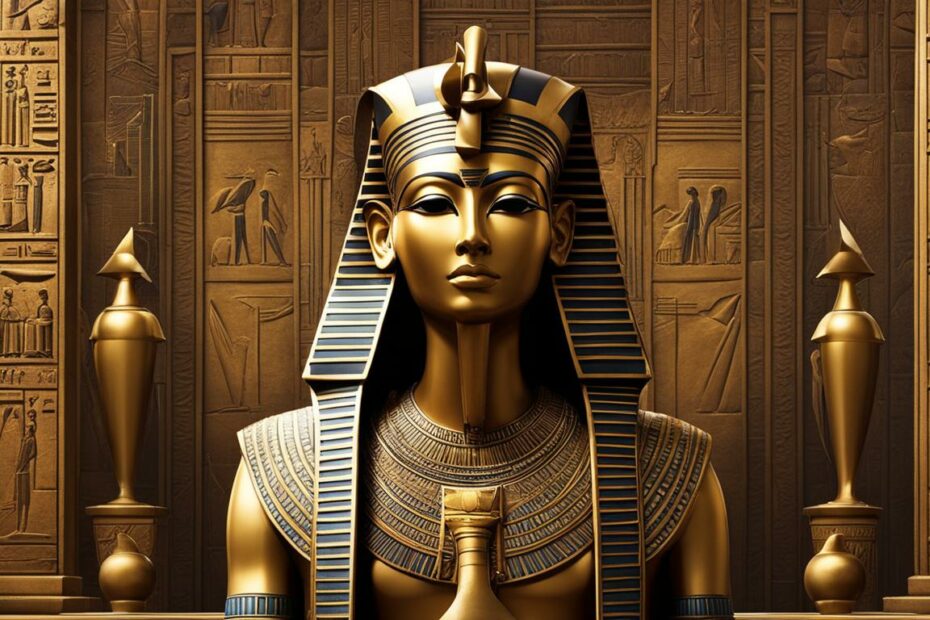Thoth, also known as Djehuty, is a prominent figure in Egyptian mythology and a deity associated with wisdom, writing, and magic. Revered in ancient Egypt, Thoth played a significant role in the cultural, religious, and intellectual life of the civilization.
Depicted as a man with the head of an ibis or a baboon, Thoth symbolizes the power of knowledge and the importance of written language. His presence can be found in Egyptian temples, manuscripts, and artifacts, showcasing his immense influence in ancient society.
As the god of the moon, Thoth’s divine authority extended beyond writing and wisdom. He governed the realms of knowledge, science, art, and judgment, embodying the multifaceted nature of human existence.
This article explores Thoth’s name and origins, his symbols and depictions, his roles and powers, as well as his worship and importance in ancient Egypt. Additionally, it delves into Thoth’s role in the afterlife and his connection to the judgment of the deceased.
Join us on a captivating journey through Egyptian mythology as we unravel the mysteries surrounding Thoth, the god of wisdom and writing. Discover the profound meanings and symbolism associated with this ancient deity, and gain insight into the impact of Thoth’s influence in Egyptian culture.
Thoth’s Name and Origins
Thoth, also known as Djehuty, gets his name from the Ancient Egyptian word that means “He who is like the ibis.” This avian association is evident in the depictions of Thoth, often portrayed with the head of an ibis or a baboon. The Greek equivalent of Thoth is Hermes, with similar attributes and functions. Thoth’s origins have multiple interpretations, ranging from being self-created to being born from the lips of Ra, the supreme god in ancient Egyptian mythology. Nonetheless, Thoth’s association with Ra and the concept of divine order and justice hints at his significance in the pantheon.
Symbols and Depictions of Thoth
Thoth, the ancient Egyptian god of wisdom and writing, is associated with various symbols and depictions that represent his multifaceted nature. These symbols not only visually convey Thoth’s attributes but also provide insights into his significance within Egyptian mythology.
Ibis Symbolism
One of the most prominent symbols associated with Thoth is the ibis, a long-legged bird with a curved beak. Thoth is often depicted with the head of an ibis, emphasizing his connection to this avian species. The ibis symbolizes wisdom, knowledge, and intellectual pursuits, highlighting Thoth’s role as the provider of divine wisdom and a patron of scholars and scribes.
Baboon Depictions
In addition to the ibis, Thoth is also depicted as a man with the head of a baboon. The baboon was believed to possess magical powers and was associated with the moon, intelligence, and cleverness. By embodying the baboon, Thoth represents intellect and strategic thinking, reflecting his status as a divine mediator and his role in maintaining cosmic balance.
Writing and Wisdom Symbols
Thoth’s association with writing and wisdom is symbolized by various objects often depicted alongside him. These symbols include:
- A moon disk: Represents Thoth’s connection to the moon, which was associated with knowledge, divination, and the measurement of time.
- A papyrus scroll: Signifies Thoth’s role as the inventor and protector of writing, emphasizing his importance as a scribe and a keeper of knowledge.
- Reed pens and a writing palette: Symbolize Thoth’s patronage of scribes and his influence in the fields of literature, poetry, and record-keeping.
- A stylus: Represents Thoth’s ability to inscribe divine decrees and maintain cosmic order through his writings and judgments.
These symbols and depictions of Thoth collectively reinforce his status as the god of wisdom, writing, and intellect. They also highlight his connection to the moon and his role in recording, preserving, and disseminating knowledge throughout Egyptian society.

Thoth’s Roles and Powers
Thoth played an array of significant roles in Egyptian mythology, showcasing his immense power and influence within the pantheon. As the scribe of the gods, he held the vital responsibility of recording and preserving divine knowledge, making him the creator of writing and hieroglyphs. Thoth’s expertise extended far beyond mere transcription, as he possessed unrivaled mastery over various fields.
With his celestial wisdom, Thoth delved into the realms of astronomy, decoding the secrets of the heavens and unraveling the mysteries of the cosmos. In the realm of astrology, he charted the movements of celestial bodies and their profound influence on the lives of mortals. Thoth’s profound knowledge of numbers and mathematics made him the patron deity of scholars, guiding their inquiries into the intricate patterns that underlie the universe.
Thoth’s vast understanding of medicine and healing granted him immense authority in matters of health and wellness. Known as the divine physician, he bestowed his blessings upon healers, guiding them in their endeavors to alleviate suffering and restore balance to the body.
Furthermore, Thoth’s theological expertise made him the ultimate authority in matters of spirituality. He guided and educated the gods, serving as the divine counselor and mediator in times of conflicts and disputes. Thoth’s role as the dispenser of divine justice was instrumental in upholding order and harmony within the cosmic order.
In the afterlife, Thoth’s powers extended to the judgment of the deceased. Aided by his innate knowledge and impartiality, he presided over the weighing of the heart ceremony in the Hall of Truth. The souls of the departed faced his discerning scrutiny, as he determined their fate based on the purity of their hearts and alignment with Ma’at, the eternal order of the universe.
Thoth’s diverse powers and roles solidified his stature as one of the most revered deities in ancient Egyptian mythology. His legacy as the scribe of the gods and creator of writing reverberates through the annals of history, leaving an indelible mark on the civilization that cherished wisdom, knowledge, and the power of the written word.

Worship and Importance of Thoth
The worship of Thoth was widespread in ancient Egypt, with his major cult center located in Hermopolis. He was revered by scribes, kings, and priests, and his name was often taken by the rulers of Egypt. Thoth’s importance lay in his association with knowledge, writing, and magic, as well as his role as a just and incorruptible judge.
| Thoth’s Worshipers | Thoth’s Importance |
|---|---|
| Scribes | Thoth, the god of wisdom and writing, was highly esteemed by scribes who admired his mastery over language and knowledge. |
| Kings | Thoth’s influence extended to the ruling class, with many Egyptian Pharaohs taking his name as part of their royal titles, signifying the connection to divine wisdom. |
| Priests | Priests recognized Thoth’s power and sought his guidance in religious matters, believing he would intercede on their behalf with the other deities. |
Thoth’s cult center in Hermopolis attracted pilgrims from all over Egypt, who sought blessings from the god of wisdom. The cult of Thoth was characterized by rituals, festivals, and prayers, demonstrating the deep reverence and devotion the ancient Egyptians had for him.
Thoth’s importance extended beyond his association with knowledge and writing. He played a crucial role in the judgment of souls in the afterlife, ensuring fairness and justice. As the scribe of the gods, he recorded the deeds of the deceased, assisting in the final judgment in the Hall of Truth.
Thoth’s worship and cult center in Hermopolis solidified his position as a revered and significant deity in ancient Egyptian society. His influence on the fields of wisdom, writing, and magic, along with his role as a just judge, made him an integral part of the pantheon and a focal point of religious devotion.
Thoth in the Afterlife
In the ancient Egyptian belief system, Thoth played a crucial role in the afterlife. As the god of wisdom, writing, and judgment, he stood alongside Osiris and Anubis in the Hall of Truth. In this sacred space, the judgment of the dead took place, determining the fate of the deceased in the next life.
Thoth’s responsibility was to record and report the outcome of the weighing of the heart against the Feather of Truth. According to Egyptian mythology, the heart of the deceased was weighed against Ma’at, the symbolic feather representing truth and justice. Thoth meticulously recorded the results, ensuring fairness and accuracy in the judgment process.
With his deep knowledge and understanding of the spiritual realm, Thoth guided the souls of the deceased through the afterlife. His presence provided comfort and guidance as they embarked on their journey towards the Field of Reeds, the final resting place for those who passed the judgment. Through Thoth’s guidance, the souls would find eternal peace and happiness in this tranquil realm.
FAQ
Q: Who is Thoth in ancient Egypt?
A: Thoth, also known as Djehuty, is an ancient Egyptian deity associated with wisdom, writing, and magic. He is often depicted as a man with the head of an ibis or a baboon.
Q: What is Thoth’s name in Ancient Egypt?
A: Thoth’s name, Djehuty, is derived from the Ancient Egyptian word meaning “He who is like the ibis.”
Q: What are the symbols and depictions of Thoth?
A: Thoth is symbolized by an ibis, a moon disk, a papyrus scroll, reed pens, a writing palette, or a stylus. He is frequently depicted as a man with the head of an ibis or a baboon.
Q: What roles and powers did Thoth have?
A: Thoth held numerous important roles, including being the scribe of the gods, credited with the invention of writing and hieroglyphs. He possessed extensive knowledge in various fields and was responsible for the judgment of the deceased.
Q: How was Thoth worshipped in ancient Egypt?
A: Thoth was worshiped by scribes, kings, and priests, and his major cult center was located in Hermopolis. His name was often taken by the rulers of Egypt.
Q: What was Thoth’s role in the afterlife?
A: In the afterlife, Thoth played a crucial role in the judgment of the deceased. He stood beside Osiris and Anubis in the Hall of Truth, recording and reporting the outcome of the weighing of the heart against the Feather of Truth.

